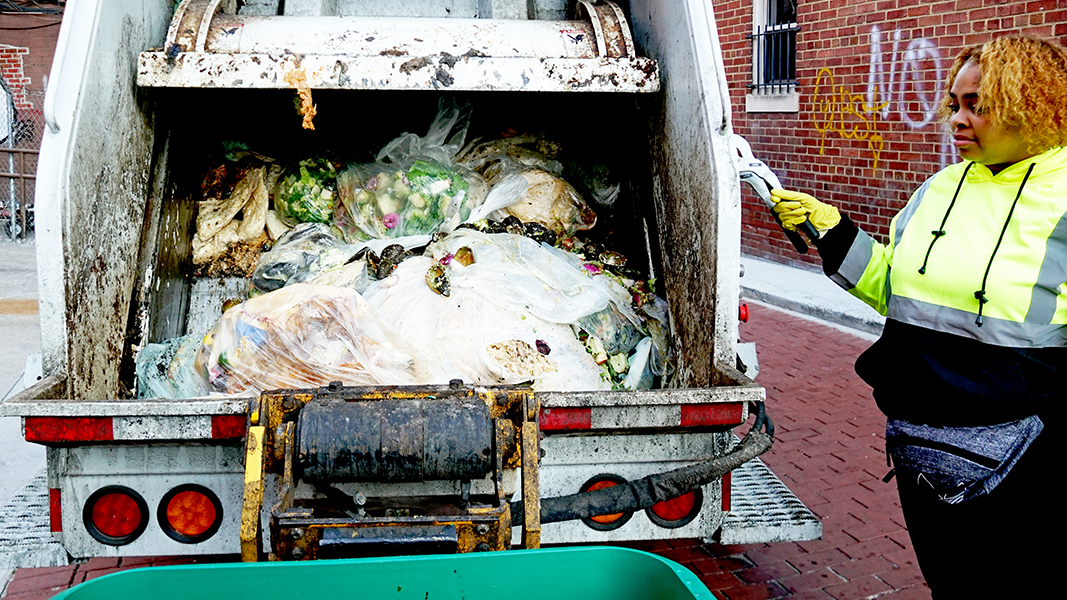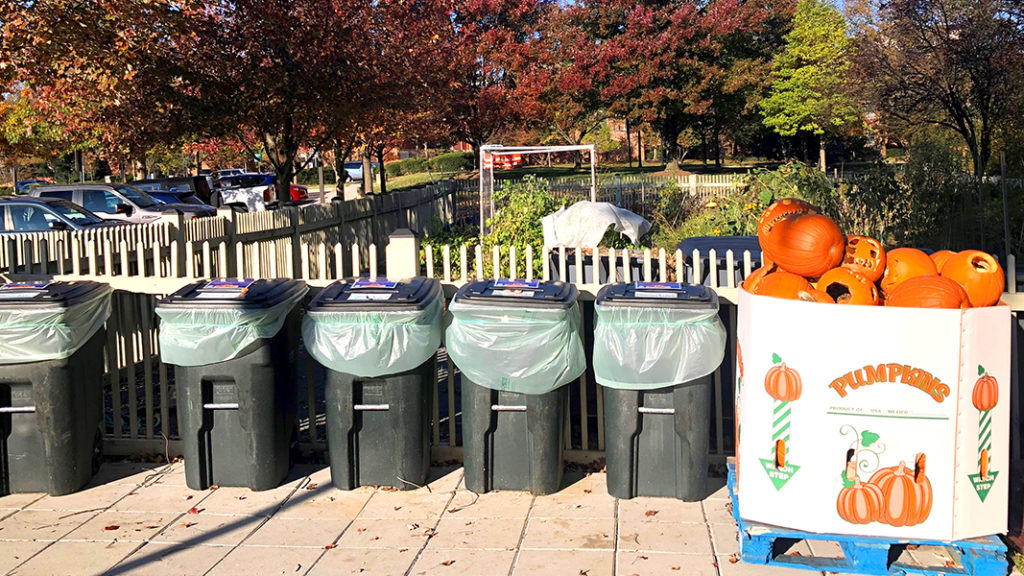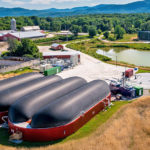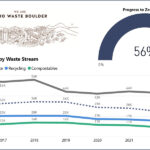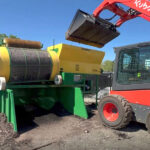Nora Goldstein
Compost Crew, based in Rockville, Maryland, is celebrating its 10th anniversary in April 2021. The food scrap collection company was started in 2011 by Ryan Walter and Brian Flores, and offered curbside service to residents in the Washington, D.C., Maryland and northern Virginia region. It also worked with several municipalities to start subsidized residential curbside collection programs. In 2017, the City of Falls Church, Virginia, which had previously offered a drop-off composting site, decided to start a curbside collection program and Compost Crew was awarded the contract. Most of the organics collected were being taken to the Prince George’s County Organics Composting Facility in Upper Marlboro, Maryland. Over the years, Compost Crew also began servicing commercial food waste generators.
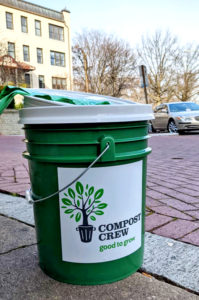
A 5-gallon bucket with a compostable liner is offered for residential curbside collection service. Photos courtesy of Compost Crew
In 2018, Compost Crew was purchased by Ben Parry, who saw an opportunity to expand the company and the services it offers in the D.C. metropolitan region. Parry, CEO of Compost Crew, worked in the renewable energy sector, primarily on utility scale wind and solar installations in developing countries. “When I left the energy industry in early 2018, I decided to focus on zero waste — and specifically organics,” he notes. “I was looking for an investment close to home and the timing was right for the founders of Compost Crew, who had done a great job of establishing a strong foundation and good reputation, to sell the company. At the time, there were 3 collection trucks and we are now up to 11 dedicated food scrap collection vehicles, and 30 employees. We service over 5,000 households in the region. We also acquired a local commercial food scrap hauler in 2018, leading to rapid growth in our commercial business.”
The company has collection vehicles in a range of sizes to service all types of residential and commercial customers. Bin sizes start at 5-gallons and go up to dumpsters for commercial accounts. In 2020, Compost Crew had its best year on record, despite the COVID-19 pandemic. Its business grew by 50%, including the addition of over 1,500 additional homes. Close to 2,500 tons of food scraps were diverted to composting. Dozens of the company’s commercial customers put collection on hold in 2020 due to COVID, but the gap was made up by the addition of more households and program expansion by some of Compost Crew’s institutional clients, a grocery store chain and some multifamily properties. All food scraps are accepted, along with any yard trimmings that can fit in the bin, soiled paper, and BPI-certified compostable foodservice ware.
Municipal Service Models
Households can sign up for weekly food scrap collection for a fee of $32/month. They receive a 5-gallon bucket lined with a compostable bag. Each week, a fresh liner is put in the bucket after the food scraps are emptied. In some cases, where the municipal government does not subsidize food scraps collection, Compost Crew will work with residents to get 50 to 100 households in a neighborhood to sign up for the service, providing route density. “That enables us to reduce the fee per household,” says Parry.
The company is working with a growing number of municipalities to set up drop-off locations to service residents. In 2020, food scrap drop-off sites were opened on behalf of municipal governments in Fairfax County (VA), Berwyn Heights (MD), and the City of Greenbelt (MD). “We also worked with various ‘mini-municipalities’ within Chevy Chase (MD) to launch residential curbside collection programs,” he adds. “Drop-off sites are typically less expensive for municipalities to initiate a residential food scrap collection program, but it can limit the number of people able to participate. The key is figuring out how to make collection as simple, convenient and affordable as possible. For some municipalities, that means starting out with drop-off sites and then if the program grows in popularity, determine the most economical option for curbside collection.”
In Falls Church, for example, the city has a cost-sharing arrangement with households who participate in the program. When it started in 2017, the monthly fee was $6, and the city subsidized the remainder of the collection cost. To incentivize households to sign up, Falls Church offered six months of free service to the first 600 participants who enrolled. It also paid for the curbside bins. Today over 20% of homes in Falls Church participate in the program, according to a Municipal Food Scrap Collection white paper prepared by Compost Crew. Residents pay a one-time fee of $10 for the bin when they enroll. The monthly fee is still $6, with the city subsidizing the remaining cost. The city continues to offer a free drop-off location for residents who don’t sign up for curbside service.
Distributed Composting Venture
In 2020, a second commercial-scale composting facility opened in the region — Freestate Farms in Manassas (VA) — providing Compost Crew with another outlet for the food scraps it collects. But with 40 routes per week all over the metropolitan region, and increasing demand for food scrap composting capacity, Compost Crew introduced an innovative new modular composting system, branded Compost Outpost™, which can be installed on farms, corporate and university campuses and municipal sites. “We partnered with Benny Erez of ECO City Farm in Hyattsville (MD),” explains Parry. “ Compost Outpost uses containers, divided into two aerated bays. Each bay has capacity to process one ton of food scraps per week. Our goal is to build more of our own distributed composting capacity to service our collection routes.”

The first Compost Outpost™ system was installed at One Acre Farm in Dickerson, Maryland. A concrete mixing pad is in the upper right corner. The four aerated bays (inset) are on an impermeable surface.
The first Compost Outpost was installed at One Acre Farm in Dickerson (MD). The site has two containers with a total of four aerated bays. Food scraps are unloaded and mixed with hay and wood chips on a concrete pad, using a skid steer loader. After four weeks of aerated static pile composting in the bays, the compost is cured for about two months before being utilized on the farm. “The design and operation are simple and affordable, and we can build resilient infrastructure and reduce our hauling costs by having access to these distributed sites,” he adds. “These are tight circular loops designed to reduce our carbon footprint in terms of collection, while building better soils and helping local farmers and gardeners grow healthier crops.”
In Maryland, composting sites processing food scraps that have no more than 5,000 sq. ft. “in support of composting” are exempt from having a permit. The operation at One Acre Farm falls into that category. “This scale of composting avoids a long legal, permitting process, but the reality is that you can’t do a lot on 5,000 sq. ft., especially when you need a road and mixing area,” notes Parry. “We hope to see that change over time, especially for on-farm composting.”
The company actively supports compost advocacy at the state and local levels, and helped form the new Maryland Compost Advocacy Coalition to work on state legislation. “In Maryland, a lot of effort is going into an organics mandate that requires generators of more than 2 tons/week of food waste to participate in food recovery and food waste recycling practices,” he says. “There is a bill in the Maryland General Assembly that our Coalition is helping to advance.”


